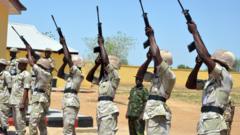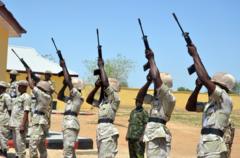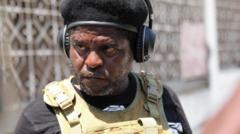The recent attacks in Colombia, which resulted in at least 18 deaths and numerous injuries, signal a resurgence of violence and pose significant challenges to the country's fragile peace.
At least 18 dead, dozens injured in Colombia's recent violent attacks

At least 18 dead, dozens injured in Colombia's recent violent attacks
A wave of violence in Colombia leaves a devastating toll as two separate attacks shock the nation
At least 18 people have been reported dead and many more wounded following two separate attacks in Colombia, marking a troubling escalation in the nation's ongoing security crisis. A tragic car bomb explosion in the bustling western city of Cali claimed six lives and left over 60 injured, according to local authorities. Meanwhile, a drone strike against a police helicopter in a rural area near Medellin killed at least 12 police officers.
Both incidents have been attributed to factions associated with the now-dissolved Revolutionary Armed Forces of Colombia (Farc). These attacks come as Colombia approaches a crucial election year, intensifying concerns over the stability of the peace process established a few years ago.
In response to the violence, Cali’s Mayor Alejandro Eder announced martial law for the city, along with a temporary ban on large trucks entering the urban area. Eder called upon citizens to remain vigilant and report any information related to the attacks, promising a reward of $10,000 for actionable tips.
In a statement shared on social media, the Ministry of Defence reaffirmed a commitment to counter-terrorism efforts, condemning the attacks and vowing to bring the perpetrators to justice. “The state will not yield to terrorism. These crimes will be pursued and punished with the full force of the law,” they stated.
Eyewitness accounts describe the car bomb in Cali targeting the Marco Fidel Suarez Military Aviation School, causing significant damage to nearby homes and injuries to innocent civilians. "There was a thunderous sound of something exploding near the air base," remarked one witness, highlighting the chaotic nature of the scene.
Defence Minister Pedro Sánchez labeled the car bomb an "act of terrorism," asserting that the attack was orchestrated by a narco cartel linked to the Farc. He claimed it reflected a desperate response to law enforcement's efforts in neutralizing drug trafficking in the region.
The drone attack against the police helicopter was particularly devastating, as it occurred while the aircraft was reportedly on a mission to eradicate coca crops, a primary component of cocaine production. After being struck by a drone, the helicopter crashed in a forested area in Amalfi, resulting in the deaths of all twelve officers aboard. Images shared on social media captured visages of thick smoke billowing from the forest, marking the somber aftermath.
This series of violent incidents adds to a growing trend of attacks in Colombia, where clashes between government forces and dissident groups have intensified in recent months. The rise of drone attacks has been particularly concerning, with 115 documented in the previous year, primarily committed by armed illegal groups. Just last week, Colombia mourned the loss of three soldiers in a similar drone assault featuring explosive-laden drones targeting military checkpoints.
As Colombia grapples with these alarming developments, the impact on its political climate and public safety remains to be fully seen.





















